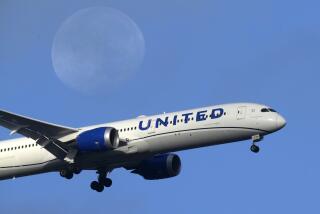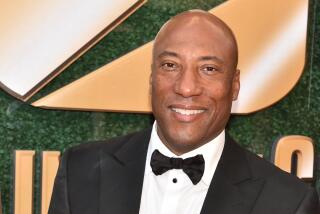Pilots Union Leads Bid of $6.5 Billion for UAL : Plan Would Give Employees a 75% Stake
- Share via
United Airlines’ pilots, joined by the company’s senior managers and British Airways, Friday bid $6.5 billion for the parent company, UAL Corp., topping the $6.2-billion offer by Los Angeles billionaire Marvin Davis.
UAL said the new proposal, valued at $300 a share, would give employees a 75% stake in the airline. UAL’s top managers, including Chairman and Chief Executive Stephen M. Wolf, would get a 10% stake, and British Airways would end up with 15% of the carrier.
Although the bid tops Davis’ $275-a-share offer by $25, UAL said Friday that Davis has indicated that he might raise his offer to more than $300 a share after a review of confidential corporate information.
UAL said that no decisions were made by its board Friday and that the board is willing to consider other offers as well, a step that could trigger a bidding war for the airline.
UAL’s shares jumped $7.25 Friday to close at $287 in active New York Stock Exchange trading. The pilot-led offer was announced after the market closed.
A spokesman for Davis said he was studying the situation with his advisers Friday and would not comment immediately. Davis had previously taken steps to unseat UAL’s directors, except Wolf, if the board failed to consider a sale of the airline.
‘The Best Alternative’
United is the nation’s second-largest airline. It operates an extensive domestic route system from its principal hub in Chicago and owns valuable transpacific routes. The airline has been an occasional takeover target for more than two years. In 1987, it sold off its hotel chains and rental car subsidiary to resist dual threats from its pilots union and Coniston Partners, a New York investment firm.
The pilots union is the only employee group to endorse the proposed buyout with management and British Airways. Its leadership met in New York for three days earlier this week to develop the proposal and has committed at least $300 million to finance the transaction. In a statement, the pilots said they were pleased that the board agreed to consider their proposal.
In a statement Friday, Wolf was enthusiastic about the plan. “This represents the best alternative for all our constituents,” he said. “Our current shareholders get fair and full value for their investment.”
Wolf stands to benefit financially from any takeover plan. At $300 a share, his stock options are worth around $75 million.
The proposed transaction would strengthen British Airways’ marketing arrangement with United and tighten links between British Airways’ routes in Europe, Africa and East Asia to United’s North American and transpacific routes. British Airways controls 90% of the overseas air travel from Britain and 40% of the U.S.-British air travel market.
It was not clear Friday how United’s other labor groups would react to the proposal. In a statement, UAL said it planned to give employees a stake in the company through an employee stock ownership plan, or ESOP. UAL said membership in the ESOP would require labor concessions, possibly including cuts in wages and benefits and increased productivity.
The machinists union has been cool to any proposal to restructure or sell United. Brian Freeman, an adviser to the machinists, said Friday that he had not seen the buyout proposal and had not been contacted by either United’s pilots or managers.
Carol Holmes, vice president of the United’s flight attendants union, said her group would consider “any proposal that involves employee ownership.” In the past, flight attendants were ambivalent about an ESOP. Flight attendants earn less than United’s other labor groups and are reluctant to trade wage concessions for an ownership stake.
Delicate Bargaining
The Davis offer does not involve concessions by the unions.
There were indications that it might be difficult to unite labor behind the pilot-management bid. The machinists and pilots have often been at odds over the future of United. Moreover, an executive at another airline said agreement on the plan would require delicate contract bargaining, which cannot be accomplished overnight.
UAL said the pilot-management bid was subject to a number of conditions, including obtaining financing. However, financial sources said that because of the involvement of British Airways and United’s top managers, the group would have little difficulty borrowing funds.
However, details on the equity portion of the financing were sketchy. British Airways, the world’s biggest international carrier, issued a statement saying that it had agreed in principle to invest $750 million.
Earlier reports about the group’s proposal indicated that the pilots union might put up as much as $1 billion, with funds coming from two of the union’s pension funds, one of which is over-funded. But UAL would not comment Friday on this aspect of the plan.
It also was not clear how the U.S. Department of Transportation might view the proposed involvement of British Airways. On Thursday, Assistant Secretary Jeffrey N. Shane said the department would look closely at future transactions involving foreign ownership of U.S. airlines. Foreigners may own up to 25% of a U.S. carrier.
Shane also said Thursday that the department would carefully weigh marketing arrangements between U.S. airlines and foreign carriers.
Value to Travelers
British Airways’ marketing agreement with United has been highly successful. The two airlines share facilities at several U.S. airports, British Airways participates in United’s frequent-flier program, and the two airlines jointly market international vacation packages.
The value to the traveling public of a closer link between United and British Airways has been questioned by some aviation experts. In a July interview with The Times, for example, Alfred E. Kahn, a Cornell University professor and former Civil Aeronautics Board chairman, said a tie between the carriers would restrict competition because both airlines are so strong in their home markets.
More to Read
Inside the business of entertainment
The Wide Shot brings you news, analysis and insights on everything from streaming wars to production — and what it all means for the future.
You may occasionally receive promotional content from the Los Angeles Times.










